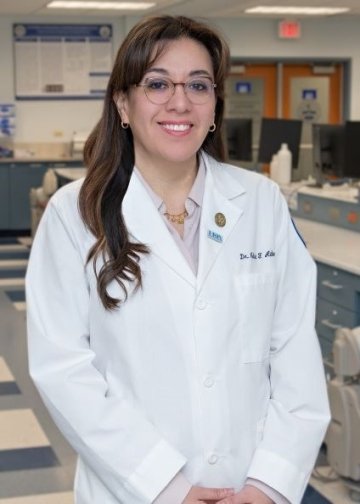
"I’ve never worked in a clinic that offers so much support for patients in the community. The opportunity to care for patients in such a collaborative environment makes MWU a truly special place."
How many years have you worked at Midwestern University?
I was hired at the Therapy Institute to begin seeing adult patients for their occupational therapy needs. I’ve been at Midwestern for a year and four months. I’m also an MWU alumnus and graduated from the Occupational Therapy Program in 2014.
What are your research interests?
- Neurorehabilitation
- Healthcare inequity
- Social justice and health
- Trauma-informed care
What is the most rewarding part of being a member of the Midwestern University faculty?
I work in the Therapy Institute and spend most of my time collaborating with other disciplines to care for patients and support students effectively. In the Therapy Institute, there are five different disciplines which include Occupational Therapy, Physical Therapy, Speech-Language Pathology, Vision Therapy, and Clinical Psychology. I’ve never worked in a clinic that offers so much support for patients in the community. The opportunity to care for patients in such a collaborative environment makes MWU a truly special place.
How do you engage students in the learning process?
Since I work in the Therapy Institute, I focus on experiential learning and connecting what students are learning in the classroom to real patients. I believe students feel most engaged when they have the opportunity to connect with patients, practice hands-on techniques early, and then reflect on their experiences.
What do you hope students learn from your classes?
As a clinical faculty member, I spend time helping in courses, but I primarily work with students in applied practice. I hope to connect students to patients’ narratives to allow for personal and professional transformation. Guiding students in their ability to think critically and utilize effective techniques for functional change is important, but coming to understand the value of listening with intent and supporting patients in the pursuit of achieving their personally meaningful goals should guide one’s practice.
What lessons would you like students to take with them in their professional careers?
The experiences they will have with the patients they care for will be wonderful, and at times painful and confusing. Supporting and walking alongside patients as they experience change, which often comes in the form of loss, is incredibly challenging, but also deeply sacred. I would like students to understand how privileged we are to be with people in some of their most vulnerable and difficult times.
What about your profession should people know more about?
Occupational therapy is an expansive, often elusive career. I would love for other clinicians and people to know that occupational therapy is a profession that aims to support people of all ages in their efforts toward participating in life activities they feel like they need or want to do. This can be done through physical or cognitive rehabilitation, compensatory approaches, mental health therapies, and/or integrative therapies. Occupational therapists work with individuals or communities to remove barriers or hindrances to participation so life can feel more fulfilling and meaningful.
What do you like to do in your free time?
I enjoy spending time with friends and family, snuggling with my dog, Ben, and my cat, Moose, trying out delicious taco spots, and going on bike rides around the downtown Phoenix neighborhood in which I live.
Is there anything you’d like to add?
The Therapy Institute is happy to be offering adult occupational therapy services and it’s been exciting watching the practice grow and develop.



